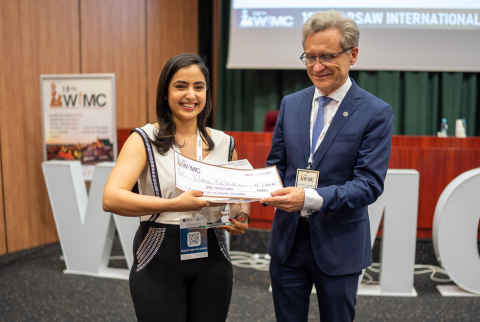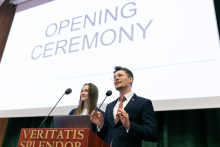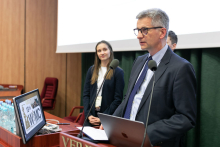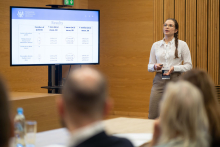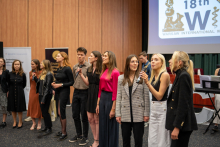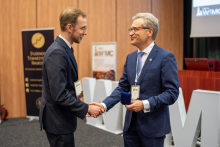The 18th Warsaw International Medical Congress was held April 21-23 at the MUW Teaching Center. The program included more than 30 thematic sessions, expert lectures, a plenary session and 30 specialized workshops. The whole event was organized by the MUW Student Scientific Society with the support of our university, in particular the Vice-Rector for Science and Technology Transfer - Prof. Piotr Pruszczyk. The event was held under the patronage of Rector Prof. Zbigniew Gaciong.
Opening Ceremony
It was led by: Anna Krawczyk, chairwoman of the MUW Student Scientific Society (STN) and chairman of the WIMC organizing committee, as well as Mikołaj Marszałek, president of WIMC. The Music Based Medicine band, formed entirely by musically talented students of our university, sang before the audience. The MUW authorities at the opening were represented by: Vice Rector Professor Piotr Pruszczyk, who spoke to the audience: - I am proud that students from the MUW STN have successfully organized such a congress. WIMC provides wonderful opportunities to discuss the future of biomedical sciences. The world is constantly changing, including when it comes to science. This is a challenge for you - young people, open to new ideas and concepts. You have chosen a scientific path. It is not easy, but it can certainly be rewarding.
An inaugural lecture is a tradition at WIMC to inspire young scientists to keep moving forward, to push the boundaries, to find new solutions. This year, Michał Wszoła, MD, PhD, a transplant surgeon and the originator of the bionic pancreas, was invited to speak. He talked about producing in 2019, together with a team from the Foundation for Research and Development of Science and the Bionic Consortium - using 3D bioprinting technology, the world's first fully vascularized prototype of a bionic pancreas.
- Every discovery starts with science. Once you've solved the science, you have to remember the regulations. That's the second part of discovery. If you don't think about it, you'll hit a dead end. And even the most beautiful discovery will not be used for clinical trials, marketing approval and further development - emphasized Michał Wszoła, MD, PhD.
Speaking about his discovery, he presented statistics: 41 pancreases transplanted in Poland (before the coronavirus pandemic) and more than 20,000 patients suffering from diabetic complications who are currently in need of this organ transplantation in Poland. - Many years ago, my colleagues and I came to the conclusion that transplantology in its current form will never solve the problem of the shrinking number of organs for transplantation. We need to be aware of this, and that is why, as a transplant surgeon, I know that transplantology should move in a new direction.
Presentations by young scientists
On Friday, starting in the morning hours, participants presented the results of their research in thematic sessions. There were as many as 30 in total, with the best presentations awarded in each of them. The works of young scientists were judged by a jury of distinguished experts in the following categories: manner of presentation, content values, attractiveness of the topic, independence of the work. The winners were announced at the closing ceremony of the congress. The awards were presented by Rector Professor Zbigniew Gaciong.
- The most important thing about the congress is the active participation of young scientists - the rector concluded. - This is the greatest pleasure and reward for us - the opportunity to see and hear our successors. Congratulations to all of you! Not everyone can be awarded, but you all gained - you learned how to present the results of your research, how to deal with stress. And if you are not called to the podium, do not think of yourself in the category of failure.
The list of winners will be published on the WIMC website
Expert lectures and workshops
This year's experts, in addition to Michał Wszoła, MD, PhD, included: Prof. Milan Stanojevic, a specialist in neonatology and pediatrics, and Prof. Sérgio N. Simões, a specialist in bioinformatics and computer science. Prof. Milan Stanojevic addressed the plenary session with a lecture "Ethical issues in neonatology: where are we heading?", which is available on youtube at the link
The perspective of a bioinformatician with more than a decade of practical experience in the application of specific analytical tools and AI in biomedical sciences was shared by Sérgio N. Simões.
WIMC attendees also enjoyed a number of specialized workshops. Among them were a variety of topics, such as surgical suturing, laparoscopy, examining newborns and their resuscitation, clinical nutrition, and conducting echocardiography. The workshops were organized by student scientific circles active at MUW.
Invitation to the next edition
Concluding the conference and bidding farewell to the participants of the event, Anna Krawczyk invited everyone to the next Warsaw International Medical Congress. The 19th edition will be held April 12-14, 2024 at the MUW Teaching Center.
